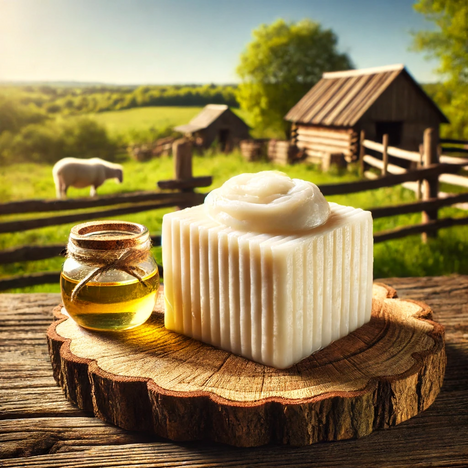Sheep fat

In the constant search for the optimal diet for our faithful companions, sheep fat has come into focus as a nutritional supplement for dogs. While some praise the potential benefits for skin and coat, others have concerns about the effects on health. So what exactly is sheep fat, and how does it balance the pros and cons of adding it to your dog's diet? In this article, we look at sheep fat from various angles to help you make an informed decision.
What is sheep fat?
Sheep fat, obtained from the fatty tissue of sheep, is a natural product that is often used in the animal feed industry as an ingredient or as a dietary supplement in its own right. It is rich in saturated and unsaturated fatty acids and serves as a source of energy as well as a carrier for fat-soluble vitamins such as vitamins A, D, E and K.
Benefits of sheep fat for dogs
Incorporating sheep fat into a dog's diet can have several positive effects, ranging from improved coat condition to increased energy intake.
- Skin and coat health: The unsaturated fatty acids it contains can contribute to a shiny coat and healthy skin.
- Energy supplier: Sheep fat is high in calories and can therefore be a good source of energy for very active or working dogs.
- Supporting nutrient absorption: Fat improves the absorption of fat-soluble vitamins, which can contribute to a dog's overall health.
- Palatability: Sheep fat can improve the flavor of the main food and can encourage food intake in picky eaters.
Disadvantages and risks
Despite its benefits, sheep fat also has potential risks that need to be considered, especially if used improperly.
- Overweight and obesity: The high calorie density can easily lead to obesity if consumed in excess, especially in dogs with lower activity levels.
- Cardiovascular disease: High levels of saturated fat can increase the risk of cardiovascular disease.
- Digestive problems: Some dogs can be sensitive to fat, which can lead to diarrhea or pancreatitis.
- Fluctuations in quality: The quality of sheep fat can vary. Low quality products may contain contaminants.
Guidelines for feeding sheep fat
To reap the benefits of sheep fat while minimizing the risks, the following points should be considered:
- Moderation: sheep fat should only be used in moderate amounts to supplement the regular diet, not as the main ingredient.
- Quality: Look for high-quality sheep fat from trustworthy sources.
- Individual adjustment: The amount should be adjusted to your dog's individual energy requirements, activity level and health conditions.
- Observation: Observe your dog for possible negative reactions to the fat and adjust the feeding accordingly.
A balancing act in dog nutrition
Sheep fat, when used correctly, can be a valuable addition to your dog's diet, especially to support their skin and coat. However, it is important to use this supplement wisely and in moderation to avoid potential health risks. Customization and careful monitoring are essential to ensure that your dog can enjoy the benefits of sheep fat without fear of negative health consequences. Ultimately, the decision to feed sheep fat should always be based on a consideration of your dog's specific needs and health conditions, ideally in consultation with a veterinarian.
If you notice any signs of hypersensitivity or poisoning in your dog, you should see your vet immediately. We are not a substitute for a vet, but we try to be as accurate as possible. Every dog reacts differently and we recommend you get a second opinion or consult your vet if in doubt.
Stay healthy and take good care of your four-legged friend!😊